Navigation
Eco-tourism in Poland Helps Organic Farming
More than a million small Polish farms (less than 7 hectares) are threatened by the coming entry of Poland to the European Union, which favors large conventional farms and methods which are harmful to health and the environment, the traditional landscape and biodiversity, and which would uproot small farmers and create further unemployment, migration to unhealthy, overcrowded cities, and destruction of the rural culture and way of life.
Location:
Nowina, Henrykow, Poland
Problem Overview:
Small farms, rural way of life threatened
More than a million small Polish farms (less than 7 hectares) are threatened by the coming entry of Poland to the European Union, which favors large conventional farms and methods which are harmful to health and the environment, the traditional landscape and biodiversity, and which would uproot small farmers and create further unemployment, migration to unhealthy, overcrowded cities, and destruction of the rural culture and way of life.
Background:
My name is Jerzy Trawinski. I was born in 1962 and spent my childhood near the Cistertian abbey in Henrykow in Southwestern Poland. Next to the abbey there was an agricultural school where my parents worked as teachers. The school had its own horseback riding club. I was ten when I first rode a horse together with my brothers.
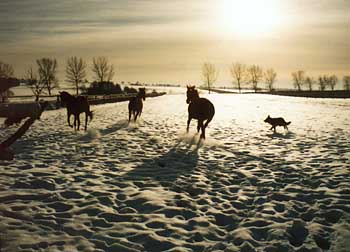 |
Horse riding became our passion. I was riding a full-blooded gelded horse that had been withdrawn from the races. We took part in competitions and shows and spent our free time at the stable. This lasted for four years, until my favorite horse fell ill and died. I didn’t ride a horse for 18 years after that. It was during those four years that I developed my love for horses and horse riding that is still one of my great passions today.
When I was 14, I left my family and started studying at a gardening school. I wasn’t thinking seriously about my education then and, because of that, I didn’t finish. Later, I lived and worked in different cities and towns in Poland. The only lasting benefit I retained from school is Kasia, the girl I shared my desk with, who is now my wife.
In order to combine my love for horses with the simple harmony of natural life, I decided to buy a farm and move to the country. For a few months I was searching for a good place which would be in a picturesque area and have enough buildings for horses and enough land. Finally, in 1987, after three months of searching, I succeeded and found an old and broken down farm in Nowina, 60 km from Wroclaw in southwest Poland. It has 3 buildings and 13 hectares of land. Nowina is a small secluded village located in the Strzelin hills with picturesque forests surrounded by rolling fields.
The farmhouse was very broken down and the garden was a mess. But the barns for horses were in good condition. Our daughter, Ania, was born here.
I designed a garden using the artistic part of my soul. I created different designs for planting trees, flowers and making small ponds. I created all this in such a way as to not disturb nature while bringing about greater biodiversity.
Aside from our big vegetable garden, we raise black currants organically. We sell part of the currants straight from the plants to our visitors. From the rest, Kasia prepares her homemade jams.
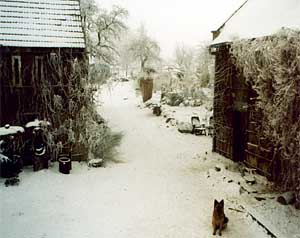 |
We slowly renovated the farmhouse, keeping the old style with its secrets.
After seven years of different activities we were ready to make a childhood dream come true - to raise horses of our own. The first horse we bought was a full-blooded mare chosen by Kasia. We already had dogs and cats, goats, hens and turkeys. We bought just two horses. The next year we had our first delivery: a lovely colt. Every year new animals were born.
Countryside living according to the rhythm of nature became our passion.
Another of my passions is for travelling. I have had the happiness of visiting Africa three times. But, while visiting New York, I was stupefied at the sight of a street seller cutting a chicken into pieces with a plastic knife. I wasn’t able to eat this chicken. And on one farm I visited, in front of my eyes I saw hens and chickens living compressed into cages, with food carried to them on a conveyor belt. I understood then how important it is to counteract this madness and have done what I can do to provide an example with my own farm.
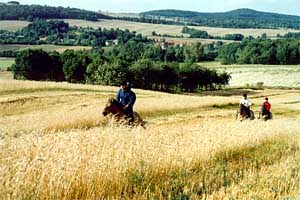 |
When, after many years, the farmhouse and garden were repaired, Jadwiga Lopata appeared with her idea that we prepare our farm for eco-tourism. Jadwiga is head of European Centre for Ecological Agriculture and Tourism-Poland (ECEAT-Poland). Its mission is to use ecological tourism to organic farms as a tool to help small farmers make a sometimes difficult transition from conventional agriculture to ecological agriculture. They also encourage humane treatment of animals and many conservation and preservation efforts to help people in the farming regions as well as on the farms themselves.
"In this way the farmers benefit financially while environmentally sound practices are spread, and the natural landscape, biodiversity and local culture and traditions are protected and shared with visitors. By working in a cooperative and ecological way small Polish farmers will be able to protect their livelihoods and their traditional way of life in a coming period of difficult economic and social transformation."
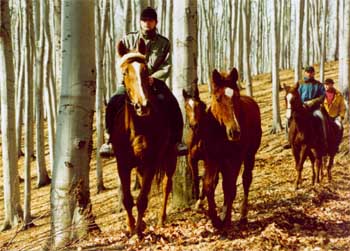 |
ECEAT-Poland was co-founded by Jadwiga Lopata, who is an Ashoka Fellow. [Ashoka: Innovators for the Public is a non-profit international organization supporting social entrepreneurs from developing countries who have innovative plans for positive social change.]
The ECEAT strategy, as explained by Jadwiga, "… is to demonstrate to Poland’s small farmers and the Polish government that Poland need not repeat the Western experience with unsustainable large-scale agribusiness, a ‘sunset industry.’ Instead, she argues, Poland has a unique opportunity to become a world leader in the ‘sunrise industry’ of organic farming. Like agribusiness, eco-farming has a series of corollary economic activities. These relate to the cottage eco-tourism industry. Unlike agribusiness and its spin-offs, eco-farming and eco-tourism are broadly-based and overwhelmingly positive for society and the environment."
ECEAT was originally established by Jadwiga's colleagues in the Netherlands as a foundation: the European Centre for Eco-Agro Tourism (ECEAT). After two and a half years working in ecology in the Netherlands, Jadwiga returned to Poland to establish and run an association, European Centre for Ecological Agriculture and Tourism--Poland (ECEAT-Poland).
I found that it was a great idea and just what I needed. Jadwiga made me aware that I have many things to offer to other people. And I realized that I should share my lifestyle with others, in the hope that they will be inspired in this direction. I realized that we need many people with ecological awareness, who will take care of the places where they are living, and at the same time will also fulfill their dreams. So, in 1997, we decided to cooperate with ECEAT-Poland.
Implementation:
At the beginning of our cooperation, ECEAT brought the idea of eco-tourism into our lives and we gave our farm an eco-tourist profile. During the meetings organized by ECEAT, we learned how to change our farm into an ecological farm.
First, our farm was identified as one "whose farmers are interested in the idea of ecological farming and ecological tourism." ECEAT visited us and provided advice about participating in the project and about its advantages.
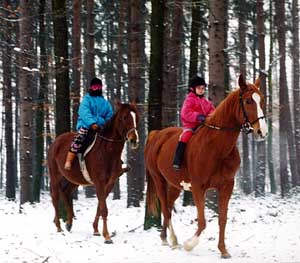 |
Then, formal training sessions were held. The goal of these training sessions is to persuade the farmers to become ecological and to participate in the eco-tourism project. Two to three trainers work in one-day training sessions to provide practical information on ecological agriculture, ecological tourism to farms, the growing market for ecological products, general ecological awareness, and the necessity for cooperation among farmers to achieve a successful transition to ecological farming. Once a farm meets Ekoland (an internationally recognized certification process for organic goods) standards for at least half of its products, it may participate in the tourism program. Ekoland alerts ECEAT-Poland immediately if one of their participating farmers falls below the threshold.
Descriptions of participating farms and their surroundings and local tourist attractions are prepared and published annually in an ecological tourism brochure in the local language as well as other languages with the cooperation of the international ECEAT network. The brochure provides information about the project’s ideas and goals, directions to the farms, information about the farms and farmers, food and accommodation availability and prices, descriptions of the surroundings, tourist activities and attractions. The brochures are distributed to interested persons. The farms are publicly marked by placards as ECEAT farms so that tourists can identify them easily. Our farm is featured in these materials, attracting tourists to our farm.
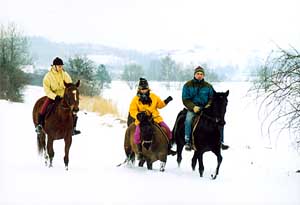 |
ECEAT also includes our farm in promotional campaigns emphasizing the social, ecological and economic goals of our farm. They use press conferences, radio and television interviews, newspaper and magazine advertisements, and articles.
Further promotion of our farm, and other ECEAT farms, is through tourist fairs and distribution of leaflets and brochures in shops and public places.
Another part of the ECEAT implementation plan is that all farms register visitors as ECEAT farm guests, and keep a financial record of income from tourists. ECEAT participants donate 10% of their tourist earnings to ECEAT-Poland to help pay for publicity.
In preparation of our farm for eco-tourists, we adapted the barn's attic for visitors. We used natural wood and brought in light through carefully placed, well-insulated skylights which we oriented so they would keep our guests in touch with our beautiful surroundings. For campers, we adapted an old storeroom for toilets and showers. And we bought a few more horses. Today we have 14 beautiful, well-trained horses.
After one year of having visitors, I was even more convinced that this was a very good idea for me and my family.
Another step was to adapt the old buildings to new technology. We added an efficient oil heating system and an inside water system which is designed to conserve water. I learned to conserve water because there is very little good water in Poland. Also, on our farm we introduced an ecological wastewater system called TURBOJET. It’s a Belgian technology that provides mechanical oxygenation of waste containers, which accelerates the biological processes.
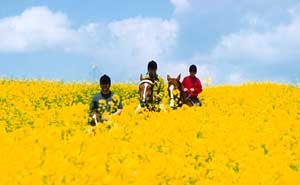 |
To our guests, we offer horseback riding tours in the picturesque and historical Polish countryside, homemade food, fruit and vegetables from our ecological garden, and a homey atmosphere. We take them on horseback for trips to the old Cistercian monastery in Henrykow which is now a UNESCO monument, to a sanctuary of old beech trees where we can ride for many kilometers on well-tended trails, to scenic towers and old mills. Riding alongside the orchards, we can reach up and pick my friend's apples, pears and plums -- all organically grown.
I design all the experiences to suit the interests and abilities of the riders. I take only small groups of riders and, as much as possible, take together riders whose abilities are similar to make the rides particularly enjoyable. I love giving our guests these chances to enjoy our horses and our part of Poland.
Thanks to ECEAT, many foreign and Polish guests are now visiting us. During the first year we had 60 visitors from Poland and Holland. In the second year we had over 100 visitors from Poland and over 50 visitors from other countries.
Our guests also have the unique opportunity to stay in a traditional village, a village that would already be a historical relic in many countries, but is still inhabited here. The people of our village are mostly elderly people. They run their farms traditionally. They hadn’t believed that it was possible to attract tourists here. However, now they are convinced, and they are delighted to sell eggs, milk and other farm products to our visitors.
Some of our villagers have planted decorative plants in front of their houses for the first time in their lives. They now feel that we have something to be proud of, and now realize that the exodus of our village’s young people to the city doesn’t have to be their only alternative. We hope that in time some other villagers in our area will join the ECEAT project.
There are many people who are searching for places like mine to visit. They are attracted to the simple lifestyle, living in harmony with nature, and they have my passion for horses. I love to teach people horseback riding and to teach them all the secrets about how to love horses. I also like the idea of small-scale tourism because this way I have real pleasure from my work, and I do not need to exploit horses.
I love my horses, my dogs and my sculptures in my garden. And in everything I am doing I have my wife's companionship.
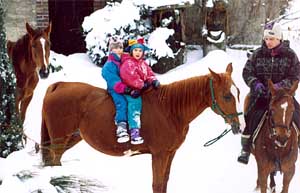 |
While I want to teach other people to do the same as I have, I never try to convince my neighbors by talking, but only by practical example. So I am happy to observe that my neighbors have started to treat their animals in a better way. They take better care of their dogs, and have learned to give more freedom to their horses when the horses are not working. And my neighbors also have started to renovate their old houses and to care more about local traditions.
We believe that by attracting visitors to the village and by propagating the idea of organic food we are acting against big companies which degrade the natural environment and which support animal breeding in meat factories, and in this way we help Mother Earth.
Submitted by:
Jurek Trawinski
Nowina 6 57-210
Henrykow Poland Tel: (48) 090 344 126
ECEAT-Poland:
European Centre for Ecological and Agricultural Tourism-Poland
Telephone/Fax: 48-33-797114
E-mail: jadwiga@icppc.pl
ICPPC - International Coalition to Protect the Polish Countryside,
Miedzynarodowa Koalicja dla Ochrony Polskiej Wsi
34-146 Stryszów 156, Poland tel./fax +48 33 8797114 biuro@icppc.pl
Information Date: 2000-07-07
Information Source: Jurek Trawinski
All photographs courtesy of Jurek Trawinski.
- Login to post comments

Search
Latest articles
Agriculture
- World Water Week: Healthy ecosystems essential to human health: from coronavirus to malnutrition Online session Wednesday 24 August 17:00-18:20
- World Water Week: Healthy ecosystems essential to human health: from coronavirus to malnutrition Online session Wednesday 24 August 17:00-18:20
Air Pollution
- "Water and Sanitation-Related Diseases and the Changing Environment: Challenges, Interventions, and Preventive Measures" Volume 2 Is Now Available
- Global Innovation Exchange Co-Created by Horizon International, USAID, Bill and Melinda Gates Foundation and Others
Biodiversity
- It is time for international mobilization against climate change
- World Water Week: Healthy ecosystems essential to human health: from coronavirus to malnutrition Online session Wednesday 24 August 17:00-18:20
Desertification
- World Water Week: Healthy ecosystems essential to human health: from coronavirus to malnutrition Online session Wednesday 24 August 17:00-18:20
- UN Food Systems Summit Receives Over 1,200 Ideas to Help Meet Sustainable Development Goals
Endangered Species
- Mangrove Action Project Collaborates to Restore and Preserve Mangrove Ecosystems
- Coral Research in Palau offers a “Glimmer of Hope”
Energy
- Global Innovation Exchange Co-Created by Horizon International, USAID, Bill and Melinda Gates Foundation and Others
- Wildlife Preservation in Southeast Nova Scotia
Exhibits
- Global Innovation Exchange Co-Created by Horizon International, USAID, Bill and Melinda Gates Foundation and Others
- Coral Reefs
Forests
- NASA Satellites Reveal Major Shifts in Global Freshwater Updated June 2020
- Global Innovation Exchange Co-Created by Horizon International, USAID, Bill and Melinda Gates Foundation and Others
Global Climate Change
- It is time for international mobilization against climate change
- It is time for international mobilization against climate change
Global Health
- World Water Week: Healthy ecosystems essential to human health: from coronavirus to malnutrition Online session Wednesday 24 August 17:00-18:20
- More than 400 schoolgirls, family and teachers rescued from Afghanistan by small coalition
Industry
- "Water and Sanitation-Related Diseases and the Changing Environment: Challenges, Interventions, and Preventive Measures" Volume 2 Is Now Available
- Global Innovation Exchange Co-Created by Horizon International, USAID, Bill and Melinda Gates Foundation and Others
Natural Disaster Relief
- STOP ATTACKS ON HEALTH CARE IN UKRAINE
- Global Innovation Exchange Co-Created by Horizon International, USAID, Bill and Melinda Gates Foundation and Others
News and Special Reports
- World Water Week: Healthy ecosystems essential to human health: from coronavirus to malnutrition Online session Wednesday 24 August 17:00-18:20
- STOP ATTACKS ON HEALTH CARE IN UKRAINE
Oceans, Coral Reefs
- World Water Week: Healthy ecosystems essential to human health: from coronavirus to malnutrition Online session Wednesday 24 August 17:00-18:20
- Mangrove Action Project Collaborates to Restore and Preserve Mangrove Ecosystems
Pollution
- Zakaria Ouedraogo of Burkina Faso Produces Film “Nzoue Fiyen: Water Not Drinkable”
- "Water and Sanitation-Related Diseases and the Changing Environment: Challenges, Interventions, and Preventive Measures" Volume 2 Is Now Available
Population
- "Water and Sanitation-Related Diseases and the Changing Environment: Challenges, Interventions, and Preventive Measures" Volume 2 Is Now Available
- "Water and Sanitation-Related Diseases and the Changing Environment: Challenges, Interventions, and Preventive Measures" Volume 2 Is Now Available
Public Health
- Honouring the visionary behind India’s sanitation revolution
- Honouring the visionary behind India’s sanitation revolution
Rivers
- World Water Week: Healthy ecosystems essential to human health: from coronavirus to malnutrition Online session Wednesday 24 August 17:00-18:20
- Mangrove Action Project Collaborates to Restore and Preserve Mangrove Ecosystems
Sanitation
- Honouring the visionary behind India’s sanitation revolution
- Honouring the visionary behind India’s sanitation revolution
Toxic Chemicals
- "Water and Sanitation-Related Diseases and the Changing Environment: Challenges, Interventions, and Preventive Measures" Volume 2 Is Now Available
- Actions to Prevent Polluted Drinking Water in the United States
Transportation
- "Water and Sanitation-Related Diseases and the Changing Environment: Challenges, Interventions, and Preventive Measures" Volume 2 Is Now Available
- Urbanization Provides Opportunities for Transition to a Green Economy, Says New Report
Waste Management
- Honouring the visionary behind India’s sanitation revolution
- Honouring the visionary behind India’s sanitation revolution
Water
- Honouring the visionary behind India’s sanitation revolution
- Honouring the visionary behind India’s sanitation revolution
Water and Sanitation
- Honouring the visionary behind India’s sanitation revolution
- Honouring the visionary behind India’s sanitation revolution

